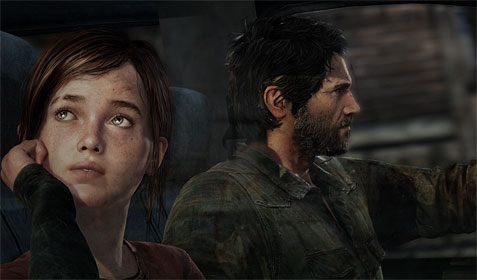“The Last of Us” is a near masterpiece

Naughty Dog’s “The Last of Us” has been available for just over two weeks now, and in that time, it’s been reviewed ad nauseam by every major games blog and even some publications that don’t normally cover that sort of thing. But it’s for good reason, because “The Last of Us” doesn’t just represent a fresh take on the survival horror genre – it delivers one of the most memorable gaming experiences in years. Unfortunately, I didn’t receive my copy until this past weekend, so doing a typical review seemed pointless. Instead, I’ve put together a list of the top 5 reasons why you should rush out and buy/rent “The Last of Us” if you haven’t already.
1) Story: There’s a lot to love about “The Last of Us,” but none more so than its rich, cinematic storytelling, which develops characters that you actually care about as they evolve throughout the game’s year-long timeline. Similar to “The Walking Dead” in many respects, the game may feature its share of zombie-like creatures to battle, but it’s the human drama that drives the story, and Naughty Dog has done something pretty fantastic in blurring the line between what’s morally right versus what’s necessary to survive. Nature can be a bitch, but in this Cormac McCarthy-inspired post-apocalyptic setting, humanity poses an even bigger threat.
2) Production value: At this stage in the current gen cycle, it’s amazing that most games still don’t take full advantage of the power behind the Xbox 360 and PlayStation 3, because “The Last of Us” is an absolutely gorgeous visual treat. The attention to detail is unlike anything I’ve ever seen, and combined with the excellent voice work (especially Troy Baker and Ashley Johnson in the lead roles), it makes the characters and environments feel remarkably realistic. The voice cast isn’t just recording lines of dialogue in a sound booth, but completely inhabiting their roles to the point that it’s like watching real actors at times, and that really lends to the cinematic quality of the story.

3) Gameplay: I’m not usually a fan of stealth-based games, but “The Last of Us” really surprised me, not only in the way that stealth is utilized during gameplay, but the feeling of achievement for pulling it off. Though the run-and-gun approach is certainly possible, between the high level of difficulty and limited supplies available, you’re bound to die more often. Thankfully, there’s a pretty forgiving checkpoint system in place, so you’re not punished too harshly for your choices. The game does get a little repetitive by the end, and there are some other minor annoyances (like those damn ladders), but it’s mostly trumped by the engaging storyline and otherwise enjoyable gameplay.
4) Factions: For as great as the single-player campaign may be, this online multiplayer mode shouldn’t be overlooked, because it adds some additional value to an already excellent game. Though it could have easily felt like a tacked-on feature designed to squeeze some extra cash from the used games market (it employs the dreaded Online Pass), there’s actually quite a bit of fun to be had from the pair of Deathmatch-style modes available. The game’s item crafting system allows for plenty of improvisation and strategy, and you actually benefit from working as a team. Plus, there’s a cool, clan-based meta-game thrown into the mix that you can either completely immerse yourself in or ignore with no consequences.
5) Future-proofing the PS3: With next-gen consoles from Sony and Microsoft coming later this year, there’s no better assurance that the PS3 will continue to be supported beyond 2013 than with a AAA title like “The Last of Us.” Surely the company knew how great this game was, but instead of delaying it for the launch of the PlayStation 4, Sony went ahead and released it now, in the dead of summer no less. If that’s not a bold statement about the future of the PS3, then I don’t know what is. “The Last of Us” really is that good, and it’s the kind of game that could even affect the outcome of the console war without being directly involved.
Related Posts
Comments Off on “The Last of Us” is a near masterpiece
Posted in: Entertainment, Game Reviews, Games








